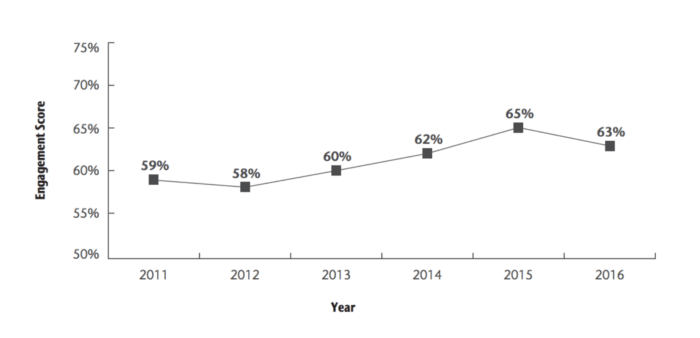How a Retailer Reinvented its Approach to Employee Training & Engagement to Drive Sales by 19%
Study Shows Global Employee Engagement May Be in Decline
A study published earlier this year indicates a surprising two percent decline in global employee engagement levels after four years of 2-3 percent annual growth. The study found that globally, only 24% of employees are highly engaged and 39% are moderately engaged. And, a closer look at the results suggests that the conventional wisdom regarding what actually drives employee engagement may no longer be true.

AON Hewitt – a professional services firm providing human resources solutions to companies worldwide – surveyed more than 1,000 organizations around the world for its report on 2017 Trends in Global Employee Engagement. The report attributes the drop in engagement levels from 2015-2016 to anxiety in the workplace provoked by changes in the political landscape that could have significant effects on the job market such as restricting the flow of labor. These anxieties are compounded by employees’ fears about new technologies that can threaten job security. While it is unclear whether the global engagement levels will continue to drop, these stresses present new challenges for company leaders as they increasingly struggle to fill open positions.
Impacts of declining engagement on financial performance
Engagement is critical to attracting and retaining talent, which in turn, has a significant impact on a company’s financial performance. The connection between engagement and revenue growth is indirect but intuitive.
According to Aon Hewitt, a five-point increase in employee engagement can improve subsequent year revenues by three points.
To illustrate the impact this increase could have on a company’s financial performance, consider a company with an average annual revenue growth of six percent. At its current engagement levels, with a revenue of $1 billion, this company could expect a growth of $60 million. However, by boosting engagement levels by five percent, that company can expect its revenue to grow by an additional $1.8 million – three percent more than average annual growth.
Research by the Hay Group, a global management consulting firm, appears to support the findings of the AON Hewitt study with results showing that organizations ranking in the top 25 percent in employee engagement enjoy revenue growth 2.5 times that of organizations in the bottom 25 percent. According to the Hay Group, employee engagement impacts a company’s financial performance in two important ways:
- High engagement levels can reduce employee turnover by four percent, which reduces the costs of finding and training new employees.
- Highly engaged employees are 10 percent more likely to exceed performance expectations, which can have a direct effect on customer satisfaction – employees that love their jobs will often go the extra mile to serve their customers, and happy customers translate into higher revenues.
Conversely, when engagement levels drop companies see higher turnover along and steeper absenteeism and, lower customer satisfaction – all of which negatively impact financial performance. Given the strong connection between employee engagement and financial performance, this opportunity may indeed be an imperative for many companies in the years to come.
Click here for your demo and see how Rallyware helps enterprises with large sales forces cut expenses, drive revenue, and transform operations.
News and Insights on Workforce Training & Engagement
We’re among top-notch eLearning and business engagement platforms recognized for effective training and talent development, helping to empower distributed workforces
Subscribe
